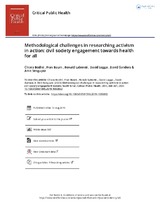| dc.contributor.author | Sanders, David M. | |
| dc.contributor.author | Bodini, Chiara | |
| dc.contributor.author | Baum, Fran Elaine | |
| dc.date.accessioned | 2021-01-06T09:42:11Z | |
| dc.date.available | 2021-01-06T09:42:11Z | |
| dc.date.issued | 2020 | |
| dc.identifier.citation | Sanders, D. M. et al. (2020). Methodological challenges in researching activism in action: civil society engagement towards health for all. Critical Public Health ,30(4),386-397 | en_US |
| dc.identifier.issn | 1469-3682 | |
| dc.identifier.uri | 10.1080/09581596.2019.1650892 | |
| dc.identifier.uri | http://hdl.handle.net/10566/5577 | |
| dc.description.abstract | Civil society engagement around health care and population health improvement is an important driver towards Health for All. Research can improve the effectiveness of health activism by examining the resources, structures and strategies of civil society engagement. However, research to support such engagement faces epistemological and methodological challenges which call for specific research strategies. A four year multi-country study was undertaken by the People’s Health Movement, a global network working for health for all. The research took place in six countries (Brazil, Colombia, DR Congo, India, Italy, South Africa) and globally, and was directed to understanding five domains of civil society engagement: movement building; campaigning and advocacy; capacity building; knowledge generation, access and use; and engaging with governance. | en_US |
| dc.language.iso | en | en_US |
| dc.publisher | Taylor & Francis | en_US |
| dc.subject | Health activism | en_US |
| dc.subject | health for all | en_US |
| dc.subject | Methodology | en_US |
| dc.subject | Participatory action research | en_US |
| dc.subject | Social movements | en_US |
| dc.title | Methodological challenges in researching activism in action: civil society engagement towards health for all | en_US |
| dc.type | Article | en_US |

